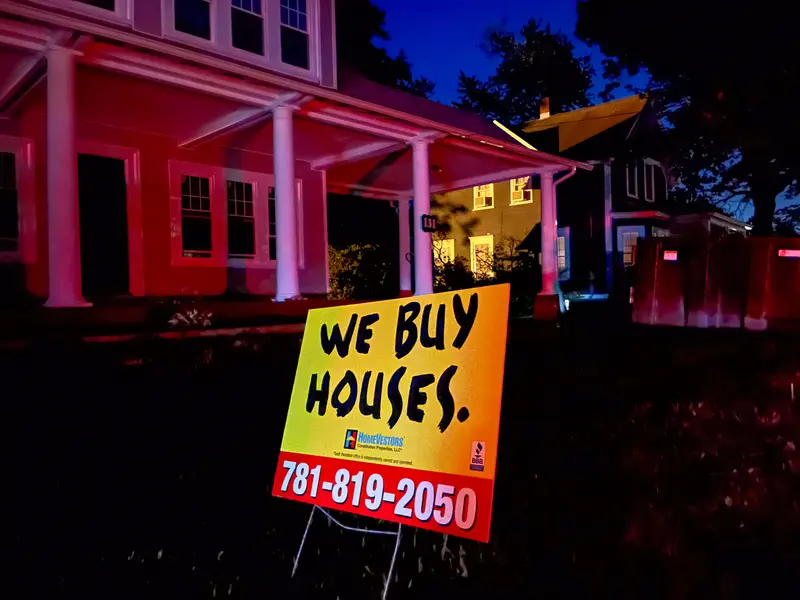HomeVestors of America, the self-described largest home buyer in the country, is continuing to reform some of its business practices in the wake of a ProPublica investigation last year that revealed predatory tactics used by the company’s franchises toward homeowners in vulnerable situations.
The company’s 1,100 “We Buy Ugly Houses” franchises will now be required to provide homeowners who sell to them with a simple disclosure. The disclosure provides a three-day window to terminate a sales contract — a safeguard that housing advocates say is critical to guarding against aggressive tactics often employed by cash homebuyers.
It also includes a resource for homeowners to evaluate their options for selling or keeping the home and encouragement to consult with a trusted family member or friend before finalizing a sale.
In addition, HomeVestors “made a series of updates” to its systems and standards, created an ethics hotline for franchise owners to report violations and changed how it trains its franchise owners, a company spokesperson told ProPublica. The company also created a team of “brand compliance auditors” to better police franchise activities, she said.
“HomeVestors takes very seriously the responsibility that comes with being the most recognized brand in residential real estate investing franchising,” the spokesperson said. “We will continue to work to ensure that our core values are reflected in everything we do.”
The changes come in response to ProPublica’s reporting last year that found some HomeVestors of America franchises used deception and aggressive sales tactics to persuade homeowners in vulnerable situations to sell their homes for far below market prices. Some franchises deployed legal maneuvers to make it nearly impossible to get out of a bad deal. While the company said at the time that it didn’t target homeowners based on age or other demographics, ProPublica found HomeVestors aimed its massive advertising apparatus at the types of houses often owned by people in desperate situations or who didn’t fully understand the value of their property.
HomeVestors said ProPublica’s reporting focused on a small fraction of the company’s overall transactions and that predatory behavior isn’t taught or tolerated. The company also moved immediately to prohibit franchises from recording notices on a homeowner’s title to make it more difficult for them to break a sales contract.
Its CEO, David Hicks, stepped down after the articles were published. Hicks said in a letter announcing his retirement that he had been planning it “for some time” but that “recent press” coverage had taken a “personal toll.”
HomeVestors’ new CEO, Larry Goodman, declined to speak with ProPublica. In an interview this month with Franchise Times, Goodman said the company has “formally prohibited franchisee advertising activities that are intrusive.”
The company’s spokesperson did not respond when asked for details on what kind of advertising is no longer allowed. She also declined to provide specifics on how its franchise training has changed under the new standards.
HomeVestors relies on ubiquitous billboards and broadcast and digital advertising. ProPublica’s reporting also found the company repeatedly sent mailers to people who had recently divorced or had a death in the family. Franchise owners also were taught to build relationships with nursing home administrators, divorce lawyers and probate officers to find people who may feel pressed to sell their home.
Burn scars, water shutoff notices, boarded-up windows and police tape represented opportunities to buy low, according to the company’s training materials. So did belongings piled on the curb: “Quickly pursue the property where the trash pile indicates eviction,” its manual instructed.
Ben Ahern, a former Los Angeles franchisee and chair of the company’s Franchise Advisory Council, called the new policies “good moves” that will “probably improve the overall health of the organization.”
"HomeVestors did seem to kind of move over the years into this lackadaisical approach to franchises that needed to be either reprimanded or booted out of the system," he said.
One housing advocate cautioned that the effectiveness of the new disclosure will depend on whether franchisees ensure homeowners fully understand the document. Sarah Bolling Mancini, co-director of advocacy at the National Consumer Law Center, said the disclosure and the cooling-off period are “positive developments.” She added that disclosures aren’t necessarily a panacea. (The disclosure is to be given to homeowners who aren’t represented by a real estate agent, but not more sophisticated sellers such as banks and real estate investors.)
“Context matters,” she said. “Written documents can only go so far. What they are told orally is very important. It’s still possible to give people a document, but to give them, overall, a misimpression of what the transaction is.”
The HomeVestors spokesperson said the single-page disclosure is an addendum to the contract that must be signed separately.
“By making this an addendum to the real estate contract, it keeps the content of the addendum from getting lost or misunderstood in the home sale process,” she said.
ProPublica’s reporting prompted calls from policymakers for better oversight of the cash-homebuying industry. U.S. Sens. Tina Smith, D-Minn., and Cynthia Lummis, R-Wyo., wrote a letter to the National Association of Attorneys General asking for more coordinated policing of the industry and passage of state-level homeowner protection laws.
While the cash-homebuying industry is subject to few federal or state regulations, some local governments have implemented tougher protections for homeowners. In Philadelphia, for example, cash homebuyers are required to provide a three-day cooling off period and make disclosures similar to what HomeVestors is now mandating.
Mollie Simon contributed research.


















